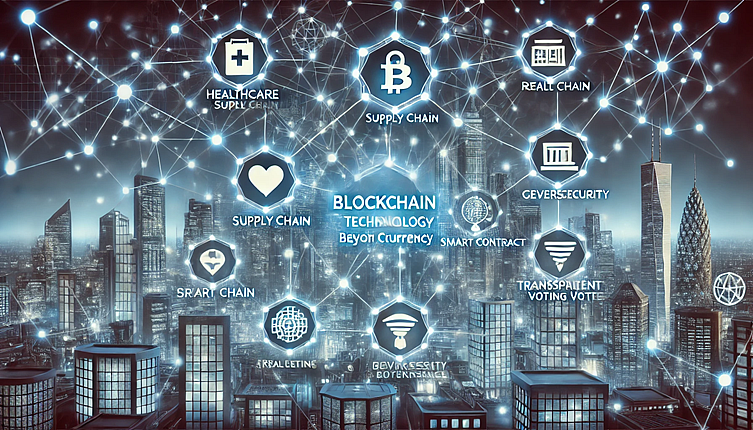Blockchain technology has been associated with virtual money for years, but the technology itself is greater than money. Blockchain has emerged as an innovation enabler over the years that has been transforming industries with its secure, open, and decentralized network. Healthcare, supply chains, real estate, and governments as well—this technology is enabling new things to be done, reducing inefficiencies, and establishing trust in industries. Its potential for revolution can be tapped to enable people and companies to capitalize on its value for a more efficient and secure future.
The Basics of Blockchain Technology
Basically, blockchain is an open and decentralized ledger of accounts that does business in a permanent manner. Unlike single-point central databases where a single entity has control, blockchain utilizes a chain of computers dispersed, protecting and limiting the risk of tampering and fraud. Transactions are validated using the consensus mechanism and then recorded forever, which makes it an ideal fit for those sectors needing security, trust, and speed.
Revolutionizing Supply Chain Management
The biggest problem of supply chain management is how to get things to move and real. Blockchain provides a real and transparent solution in the form that all the stages of a product's movement can be traced in an irreversible ledger. Organizations can trace raw materials, track production processes, and verify products without the intervention of third-party agencies.
This system avoids fraud, avoids counterfeiting, and enhances accountability. Consumers are further guaranteed information on the product purchased to ensure ethical origins and sustainability. Blockchain solutions also enhance efficiency with automated transactions and documentation reduction, which turns into cost savings and punctual delivery.
Enhancing Healthcare and Medical Records
The healthcare sector is plagued by inefficiencies, notably information management and patient confidentiality. Blockchain technology allows for a safe and decentralized method of accessing and storing medical history with ease. Instead of relying on distributed databases managed by stakeholders, blockchain allows for space for patients, doctors, and healthcare providers to view an integrated record with total openness and security.
The technology also provides improved data security, reduced data leakage, and reduced misuse. Blockchain makes sharing patient records at improved speeds between hospitals easier, which makes proper diagnosis, treatment, and follow-up treatment easier. Blockchain allows the pharma sector to prevent spurious drugs from entering the market by tracing the supply chain from manufacturing until dispensing.
Revolutionizing Real Estate and Property Transactions
The real estate market is marred by complex transactions, long paperwork, and potential forgery. Blockchain technology simplifies things with an open and immutable record of property ownership. Programmable contracts written on the blockchain, known as smart contracts, can be utilized to automate real estate transactions and eliminate middlemen.
This is achieved to prevent false claims of ownership, reduce the cost of transactions, and accelerate sales and purchases. Blockchain also enables fractional ownership, where several individuals can own a share of real estate property, and thus property investment becomes universal and makes property investment inclusive.
Improving Cybersecurity and Data Protection
As more and more cyberattacks are becoming evident, there is an increasing need for secure digital transactions and data protection more than ever. Blockchain is immune to cyber attacks and unauthorized access because it's decentralized in nature. Central databases pose the risk of single points of failure, whereas blockchain is composed of data dispersed across an immensely wide network and thereby reduces the threat of cyber attacks.
Blockchain secures identity verification systems as it does not entail the use of multiple credentials and passwords. Decentralized identity solutions guarantee that individuals are in control of and own their information without the need for intermediaries, thereby preventing identity theft and unauthorized data sharing.
Reinventing Governance and Voting Systems
The voting and governance processes are usually marred by transparency, security, and trust problems. Blockchain technology can re-engineer the voting process to be an unalterable one. Blockchain secures votes because it puts them on an impenetrable ledger, and this renders electoral processes transparent.
In addition to that, blockchain improves governance by providing secure and transparent public administration record-keeping. Distribution of social benefits, property registers, and verification of identity are all improved using blockchain, and corruption is decreased and government and citizen trust increases.
Empowering the Future of Digital Identity
Digital identity management is another area where blockchain technology is bringing a gigantic change. Traditional identity systems work with centralized databases, which are vulnerable to being breached, and identities get stolen. Identity management solutions based on blockchain give an individual complete ownership of his or her information and allow secure sharing of such information with named entities.
This technology takes on special significance in finance, health, and e-business, where identification is paramount. Blockchain does away with middlemen, and the process of proof is simplified without compromising anonymity and security.
The Road Ahead: Challenges and Opportunities
While there are numerous benefits of blockchain, some challenges also exist to its large-scale adoption. One of them that needs to be addressed so that it is adopted on a large scale is scalability, regulatory uncertainty, and energy consumption. The government and industry need to collaborate for swift policy and green solution formulation so that the real potential of blockchain can be unleashed.
Despite all these limitations, blockchain technology is in its development stage, and new uses continue to emerge across various industries. Since there are continuous R&D achievements, blockchain will be the foundation of digital transformation and deliver safe, efficient, and definitive solutions to most industries.
Conclusion
Blockchain is no longer the execution of digital money payments; it's disrupting industries in manners never before imaginable. From health records and supply chain integrity to real estate, government, and cybersecurity, blockchain is transforming the manner in which companies and governments conduct business.
As adoption speeds up, familiarity with this technology and its implications will be critical to business, policymakers, and citizens. By doing it correctly, blockchain can help us create a more secure, more efficient, and more open world for everyone.














